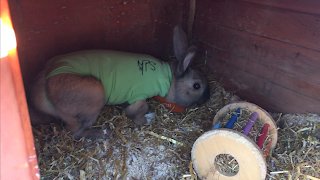It finally happened! I don't know how my children managed to avoid it for so long(they are 6 and 8) but at long last they caught Chicken Pox! Research says that 90% of children will have contracted chickenpox by the age of 4 and as a childminder I was sure my two would be in that 90%. We have always been around lots of other children at playgroups and then when they started school they both had cases of it in their classes each year but somehow they avoided it! However, when my eldest niece came down with it I figured our chances of contracting it were really high as they had spent so much time in close-proximity to her when she was at her most contagious and, low an behold, they got it!
So I thought I would just do a little blog post with some tips to help children (and their parents!) through this itchy time!
Recognising the symptoms
At first this can be a little tricky as it can start with just one or two red spots that look like any other spots but after a while you will notice more and more pop up and they will start to look like fluid-filled blisters. With Joshua he just had one for a day and we really weren't sure if it was going to become chicken pox but the next day he had about 8 and over the next few days literally hundreds popped up! Olivia's started in much the same way but she didn't get as many spots, probably about 80.
The incubation period for chicken pox (which is the time between catching the virus from somebody to the symptoms appearing) is around 10-20 days. People often mistake the incubation period for the contagious period but Chicken Pox is actually only infectious for around 2 days before the the first spots appear up until the last spot has formed a crust.
When to get help
As a general rule you don't need to take your child to the GP when they get chicken pox unless you are unsure whether it actually is chicken pox and want a diagnosis. The only other times you should see the GP with chicken pox are if a very young baby contracts Chicken Pox (under about 4 weeks old), if an adult contracts Chicken Pox or if the infected person develops complications (I will talk a bit more about this later) or has an illness which weakens their immune system.
People with Chicken pox need to be quarantined as, although it is usually a fairly straightforward illness, it can be dangerous to certain groups of people such as those with weak immune systems (eg people with HIV or those on chemotharapy) and pregnant mums who are not immune. There are a couple of pregnant mummies here (NOT me!) that I childmind for so I made sure I told them as soon as I knew that my children were infected and they were able to contact their GPs straight away and get their blood tested for immunity. Fortunately they were both immune...Phew!
Generally children recover well and there are no complications but, as with many simple illnesses, there can be exceptions to this. Some of the rare complications include infections, Sepsis, and Pneumonia. If you notice any of the following you should seek medical attention:
- any difficulty breathing
- very high fever (it's not uncommon for it to go to around 38.4 but if it goes into the high 38s I'd start to be concerned)
- nausea and vomiting
- sensitivity to light
- stiff neck
- confusion
- severe headache
- drowsy and hard to wake
- has fits (seizures)
- Dehydration from not being able to drink either due to blisters or lethargy
- blisters which look very inflamed and infected
- If the symptoms have not improved after 6 days
A spotty Olivia snuggled on the sofa
Treatment
When I was little, calamine lotion was always the parents' go-to product to help relieve the itching. These days it is not recommended because it is very drying which can lead to more itching and more chance of scarring and infection. Keeping nails short can help to prevent doing any damage if you are having trouble stopping little ones from scratching.
I found that just using Piriton antihistamine seemed to stop my children from feeling itchy at all. In the first few days I also used a product called Poxclin which comes in a bottle with a pump and comes out foamy. You spread it over the skin as often as needed. My children said it feels cool and a bit like sun-tan lotion. There are also other types of lotion available such as Virasoothe, E45 Itch relief cream and Eurax. Also, try to keep the body cool as being warm and clammy is said to worsen the itching.
Unfortunately, both my children were fairly unwell with it. They both had fevers and were quite lethargic for a couple of days. I treated the fever with Calpol (you can use any paracetamol that is suitable for children) DO NOT give Ibuprofen for the fever with chicken pox. The NHS website recommends not to use it "This is due to a very small risk of non-steroidal anti-inflammatory drugs (NSAIDs), such as ibuprofen, causing adverse skin reactions during chickenpox." this can lead to blisters forming deeper in the skin and possibly becoming infected.
Don't forget the healing power of cuddles too!
Sadly Olivia had lots of spots on her bottom and when she did a wee it would really sting! To help with this I would pour warm water over the area as she did her wee. Afterwards we would gently clean her with warm water, pat it dry, then apply Sudocream as a barrier to help protect the spots from the urine the next time she went.
The other thing to be careful about is keeping hydrated. This was tricky with my two as they both had blisters in their mouths and throats so they didn't want to eat or drink much as it hurt. I tried to entice them with drinks I knew they liked such as squash and milkshakes and they both would drink water if it was ' ice-cold'! In terms of eating I was really relaxed and just let them have whatever they fancied whenever they wanted as I felt it was more important that they got something in them rather than worrying about if they were eating healthily. A good tip is to get some ice pops (or make some from fruit juice/squash if you're house-bound) as they will numb the sore throats and hydrate at the same time. Also try offering soft foods such as soups as these are less likely to hurt any spots in the mouth.
Another thing people swear by is Oat baths. You just cut the foot out of a pair of tights and fill it with oats then hold it under the tap as you run the bath. The oaty water is supposed to be soothing. We have Aveeno for Olivia's dry skin anyway and this contains Oatmeal so it seemed to work in much the same way.
Once the fever had past they were bouncing around
with as much energy as ever - just spottier!
I hope this was helpful to you guys and that if you or your child get chicken pox there is something here that will make things easier for you!
Elizabeth x

















